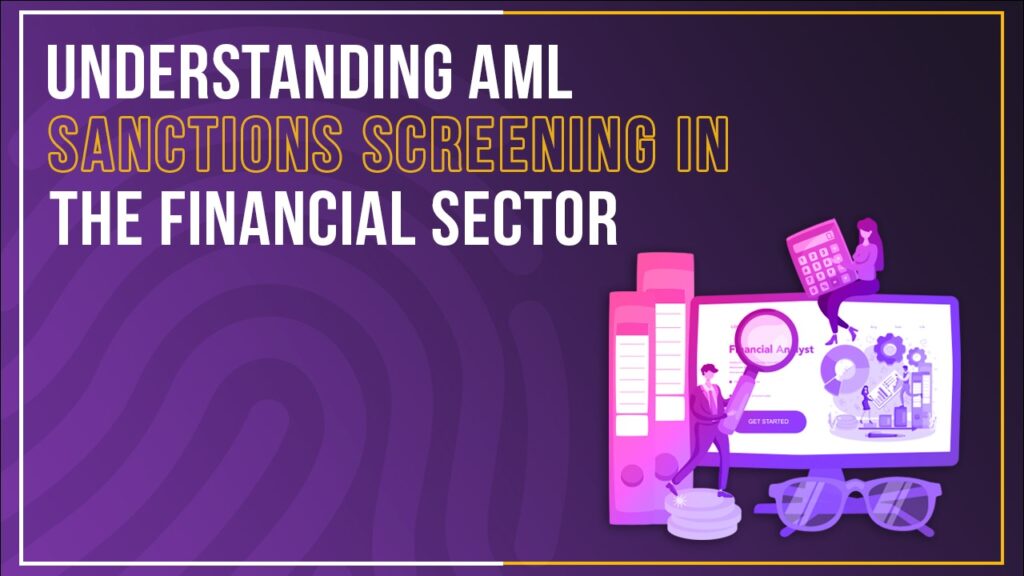Guaranteeing adherence to sanctions regulations is crucial for financial organisations functioning in the current globalised financial landscape. Authorities and global organisations use sanctions to influence global behaviour. While sanctions are important, they may be complicated and challenging to manage. Therefore, the financial sector’s integrity depends on the implementation of sanction screening, a critical component of the Know Your Customer (KYC) procedure.
What is Sanctions Screening
The systematic approach of cross-referencing people, organisations, and transactions against listings of sanctioned persons or nations kept up to date by enforcement agencies is known as sanctions screening. With the aid of sanctions screening, financial organisations are able to reduce the likelihood of sanctions breaches, reputational damage, penalties, and legal repercussions associated with sanctions violations. Sanctions screening is an essential tool in the fight against illicit financial crimes such as money laundering, terrorism funding, etc.
Understanding The Various Types of Sanctions
Economic sanctions: These are limitations on financial dealings, trade, investments and other economic activities.
Trade sanctions: To limit the import or export of particular products or services to or from a sanctioned state or organisation is the aim of these restrictions.
Financial sanctions: Financial sanctions can include seizing possessions, limiting the accessibility of financial services, or outlawing specific financial activities.
Targeted Sanctions: They are aimed against the financial possessions and dealings of specific people, groups, or countries. These are directed towards particular people, businesses, or groups engaged in actions that are deemed undesirable, such as terrorism, drug trafficking, or human rights violations.
How Sanctions Screening Works
By identifying financial risks and criminal activity, effective sanctions screening systems support adherence to Know Your Customer (KYC) and Anti-Money Laundering (AML) rules. To eradicate the laundering of funds and guarantee conformity, this procedure needs to be carried out at various crucial points. The first risk assessment takes place when a new customer is being onboarded. Organisations must check their customers against sanction listings before initiating business, paying special attention to politically exposed persons.
What is a Sanctions List?
A sanctions list is a document issued by national or international regulatory authorities. It is a publicly available document that is regularly updated and contains information on individuals, entities, territories, or countries subject to restrictions as per the international law due to economic, financial crimes or other sanctions landscape considerations.
Here are some common sanctioning bodies:
1. United Nations (UN): This pertains to every UN member state.
2. Office of Foreign Assets Control (OFAC): Covers all nationals of the United States, those carrying out business with or within the United States, individuals connected to the country in any capacity, and anyone trading in USD.
3. European Union External Action Service (EU EEAS): Preserves a list of people, groups, and nations that are sanctioned by the EU for a variety of violations.
4. United Kingdom (UK) Sanctions List: The UK government sustains a list of people, groups, and nations that are sanctioned by UK legislation.
Why Sanctions Screening is Carried Out in the Financial Sector
In the financial industry, sanctions screening is an essential part of compliance and risk mitigation. Here are the key reasons why:
1. Regulatory Adherence:
International and national regulations must be followed by financial institutions. Sanctions screening helps prevent penalties, fines, and legal ramifications by ensuring compliance with certain regulatory obligations.
2. Mitigation of Risk:
Financial institutions can lower the risk of involvement in unlawful activities including laundering of funds, funding of terrorist activity, and other financial offences by recognising and restricting dealings involving sanctioned persons or organisations.
3. Preservation of Goodwill:
Carrying out business dealings or transactions with individuals/entities that are sanctioned can seriously harm an institution's credibility. Therefore, effective sanctions screening helps avoid reputational damage for an organisation.
4. Preventing Organised Crime and Terrorism Financing:
Effective sanctions screening identifies and prevents financial support for terrorist organisations and other criminal enterprises, thereby contributing to global security efforts.
5. Enhanced Due Diligence:
As a crucial component of Know Your Customer (KYC) and Customer Due Diligence (CDD) procedures, sanctions screening provides a deeper understanding of clients and their risk profiles.
In conclusion, sanctions screening is essential for financial companies to mitigate risks, adhere to legal requirements, preserve their good reputation, and contribute to the integrity of the global financial system.
To help you make sure you are compliant, Idenfo Direct provides seamless and automated sanctions screening solutions. Our name screening feature offers access to updated government regulatory and law enforcement watchlists, along with over 100 International and National Sanctions lists. At Idenfo Direct [mena.idenfodirect.com] we facilitate your adherence to the most recent compliance laws. Book a demo to find out more today.









